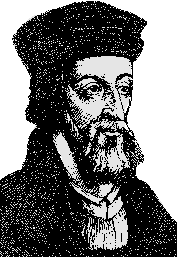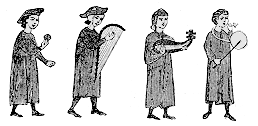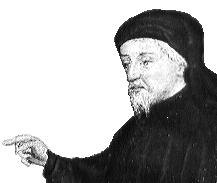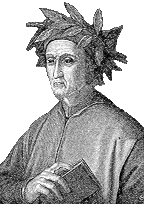 |
|
Vernacular
Languages (2) |
|
Travelling
entertainers like the troubadours
of southern France and the Minnesinger
of Germany carried vernacular
poetry and song around the courts of Europe, but this was almost entirely
an oral tradition. A written form which appeared in the French vernacular
was the romance,
undoubtedly derived from this earlier oral tradition. |
|
|
The
oldest manuscript of the famous Chanson de Roland, describing
some adventures of Charlemagne, dates from the 12th century. Legends of
King Arthur of England appear in French romances. The mammoth French romance
Le Roman de la Rose was composed in the 13th
century and over 200 manuscript copies of this work survive. Latin texts
were also translated into French. The motivation for the production of
these often lavishly illustrated works was their flaunting in the libraries
of wealthy French aristocrats. |
|
|
|
The
earliest works in the German language were in fact recorded by Anglo-Saxon
scribes in the
missionising monasteries of the 8th century. However, an expansion of
German vernacular literature occurred much later when the French epic
and romance tales were adapted into German. Around 1200, original poems
and tales of this nature were composed in the German language, including
the famous Nibelungenlied. |
|
Vernacular
songs in the Galician dialect were written by King Alfonso X of Spain
in the mid 13th century. Lavish manuscript copies of some of these survive. |
|
In
the 14th century the use of vernacular languages in literary forms became
well established. In England, the works of Chaucer were significant in
establishing Middle
English as a language of literature. Many works of prose and poetry
appeared in the vernacular. While spelling still had no standardisation,
the development of a literary tradition was a major step in developing
a standardised form of the language, comprehensible to people from various
dialect areas. |
|
|
The
earliest known portrait of Chaucer, from a manuscript of Hoccleve's Regiment
of Princes (British Library, Harley 4866, f.88). By permission
of the British Library. |
| In Italy,
Dante’s insistence that his monumental experiential religious journey from
the depths of hell to the heights of heaven should be produced in the Italian
vernacular similarly established a literary form of the language. Certain
aspects of his literary style still permeate the more elaborate forms of
the language. |
|
|
Ireland
was recovering from Anglo-Norman invasion and settlement at this time.
A consequential dearth of Irish literature during the 13th century was
followed by a conscious revival of Gaelic literature and of the older
form of Irish scripts in the 14th century. |
 |
The
formal literature of the church, including the Bible
and works of liturgy,
remained in Latin during the course of the middle ages. English language
Bibles, known as Wycliffite Bibles after John Wycliffe who inspired the
work of translating them, were denounced and eventually banned as a result
of their association with violent heretical movements. However, the appearance
of vernacular works designed for the religious instruction of the laity,
or for their moral improvement, may testify to an increase in vernacular
literacy in the later part of the middle ages. |
|
The
increasing use of the vernacular form from the 14th century onwards shows
in manuscript material of many types, including legal documents. In England,
English had overtaken French as the language of all social classes and
it was increasingly used for legal transactions, although royal documents
of the time of Henry V can be found in French. He had become king of France,
of course, and language and politics are ever intertwined. |
 |
| Beginning
of a warrant of Henry V, from a document in the National Archives, London
(C81/662/483), by permission of the National Archives. |
|
Henry
V notwithstanding, English became the language of prose and poetry, history
and chronicles, medical and practical texts, wills, charters and private
letters. By the time of Shakespeare, he could have a character in Richard
II, condemned to exile, moaning piteously about how he would have
to spend his life deaf and mute in the absence of his native tongue; a
condition that might have applied to the time of Shakespeare but not to
that of Richard II, when a member of the aristocracy might well have been
just as at home with French. |
|
The
development of the languages of English, French and German occurred after
the fall of the Roman Empire, and the politics of war and conquest had
much to do with their progress. The languages change greatly during the
course of the middle ages, and there were many dialect differences within
them. Languages such as Breton, Basque, Cornish, Welsh or the Gaelic of
Scotland survived as pockets from earlier traditions, but they are represented
in only minority form in the literate tradition. Irish, however, developed
its own vernacular literature. Texts in even the more familiar languages
of French, German or English may look very unfamiliar, and it may be necessary
to utilise an array of dictionaries and linguistic aids in order to tackle
them. |
 previous
page previous
page |
 Reading Manuscripts
Reading Manuscripts |
 Why Read It? Why Read It? |
|
|
|
|
|
|





